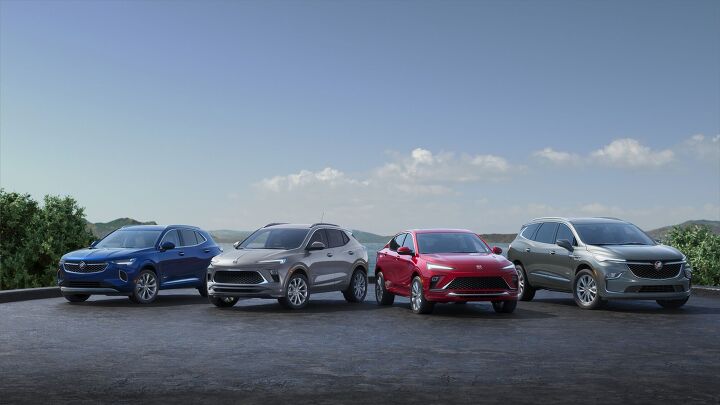Buick Dealerships Taking Buyouts, EV Sales Program Rejected By 47 Percent

Buick reportedly spent 2023 closing a lot of dealerships. The brand lost 47 percent of its American retail locations through the year, which has been attributed to General Motors buying out storefronts that refused to invest in the necessary changes required to sell all-electric vehicles.
With GM still saying it’s committed to pivoting its lineup entirely toward electrification by 2030, it wants dealerships to install requisite charging stations as service centers undergo some retooling. Sales and service departments are also supposed to get additional training to better understand how to deal with EVs. However, these changes will cost dealerships hundreds of thousands of dollars and some don’t see it as a worthwhile investment.
Ford encountered a similar situation with its EV sales program and has been forced to adjust the terms several times, walking back requirements. Smaller dealerships simply didn’t want to pay to have fast chargers installed at their stores. Most were claiming they weren’t having trouble keeping vehicles charged to begin with and others were concerned that electric sales volumes weren’t significant enough to rationalize the kind of expenditure. EVs adoption varies broadly between geographic regions, making it hard for some stores to see the point of spending so much when so few of their customers are interested.
While the total sum can vary by hundreds of thousands, based on the size and needs of individual dealerships, the average Buick showroom is estimated to be paying somewhere around $350,000 to make the changes necessary to satisfy General Motors.
Bo Mandal, chairman of the Buick-GMC National Dealer Council, told Automotive News that some dealers who opted to give up their Buick franchise wished to prioritize other aspects of the business. Sometimes this had been as simple as noticing truck sales were more lucrative, meaning they’ll be missing Buick less than they otherwise might have.
Unfortunately, Mandal seems to be viewing the situation through rose-tinted glasses. With General Motors committing itself wholly to electrification, it’s just going to be a matter of time before other marquees are subjected to the same kind of demands. Whether intentional or not, the end result seems to be mass dealer consolidation.
Buick went in 2023 with nearly 2,000 franchised dealerships located in the United States. Thanks to the EV requirements and related buyouts, almost half those stores are now closed.
From Automotive News:
The buyouts were offered on a voluntary basis and in consultation with dealers, said Duncan Aldred, vice president of global Buick-GMC. The program remains open and will "continue to be done in a voluntary and consultive way" should additional dealers choose to give up their franchise.
"I'm really pleased with where we are," Aldred told Automotive News. "The network, where we are now, is a good size. It's with dealers who are focused on the business, who've shown that they can recover the volume that the dealers who transitioned away were doing."
The roughly 1,000 dealerships that left the brand this year previously represented about 20 percent of Buick's U.S. sales, Aldred said. Dealer throughput has increased by an average of 300 percent this year, he said, adding that that shows the brand has been able to retain customers. About 89 percent of the nation's population is still within 25 miles of a Buick dealership, according to the brand.
Despite having fewer dealers, Buick said its U.S. sales rose 58 percent year over year through November, with the Encore GX subcompact crossover nearly doubling and the Envision compact crossover up 56 percent. Buick has sold more than 10,500 of its new Envista since it reached dealerships in August.
This is basically what we saw happen with Cadillac during Project Pinnacle. The luxury brand witnessed about 400 dealerships decline to update locations, allowing themselves to be bought out starting in 2016. That left Cadillac with about 900 U.S. showrooms. But the brand saw a secondary culling when GM introduced new EV requirements. Cadillac is said to have bought out about one-third of its remaining dealerships with the average payout estimates ranging between $300,000 and $500,000. Compensation for Buick dealers that are electing to bow out should be comparable.
Based on GM's third-quarter financial statement, the Buick buyout program had cost it roughly $1 billion through 2023. But the year's not over yet.
"Buick is transforming, launching the best vehicles the brand has ever had and is the fastest growing mainstream brand in 2023. This all needs to be supported by the best customer experience in the transition to EVs," Buick spokesperson Sean Poppitt stated. "As stated before, this year we’ve given dealers who are not aligned with Buick’s future to exit voluntarily in a respectful and structured way; with the full support of our National Dealer Council."
[Image: General Motors]
Become a TTAC insider. Get the latest news, features, TTAC takes, and everything else that gets to the truth about cars first by subscribing to our newsletter.

A staunch consumer advocate tracking industry trends and regulation. Before joining TTAC, Matt spent a decade working for marketing and research firms based in NYC. Clients included several of the world’s largest automakers, global tire brands, and aftermarket part suppliers. Dissatisfied with the corporate world and resentful of having to wear suits everyday, he pivoted to writing about cars. Since then, that man has become an ardent supporter of the right-to-repair movement, been interviewed on the auto industry by national radio broadcasts, driven more rental cars than anyone ever should, participated in amateur rallying events, and received the requisite minimum training as sanctioned by the SCCA. Handy with a wrench, Matt grew up surrounded by Detroit auto workers and managed to get a pizza delivery job before he was legally eligible. He later found himself driving box trucks through Manhattan, guaranteeing future sympathy for actual truckers. He continues to conduct research pertaining to the automotive sector as an independent contractor and has since moved back to his native Michigan, closer to where the cars are born. A contrarian, Matt claims to prefer understeer — stating that front and all-wheel drive vehicles cater best to his driving style.
More by Matt Posky
Latest Car Reviews
Read moreLatest Product Reviews
Read moreRecent Comments
- 28-Cars-Later Used Teslas are getting very cheap, but buying one can be risky - Ars Technica Teslas are very connected cars, and many of their convenience features are accessed via smartphone apps. But that requires that Tesla's database shows you as the car's owner, and there are plenty of reports online that transferring ownership from Hertz can take time.Unfortunately, this also leaves the car stuck in Chill driving mode (which restricts power, acceleration, and top speed) and places some car settings outside of the new owner's level of access. You also won't be able to use Tesla Superchargers while the car still shows up as belonging to Hertz. Based on forum reports, contacting Tesla directly is the way to resolve this, but it can take several days to process; longer if there's a paperwork mismatch.Once you've transferred ownership to Tesla's satisfaction, it's time to do a software reset on the car to remove the fleet version.So apparently the state maintains title but so does Tesla in a way, and they cripple some features until they feel satisfied in unlocking them to you. How long till they brick it by satellite because, reasons? But yes, rah! rah! BEV! - its not a tool of tyranny at all, honest. Edit: Comment from the Ars forum: Happy MediumArs Tribunus Militum 19y When I got to the section that stated that THE CAR WILL BE FUNCTIONALLY CRIPPLED unless you get Tesla's acceptance of you buying the car, I got incredibly infuriated. How in the hell is this going to work going forwards? Is Tesla literally going to be approving every single resale of its cars from now until the car is totaled? Jeezus, connected is one thing, but having final ownership authority in the hands of the manufacturer and not the seller/purchaser seems horrible. 28's thoughts to Happy Medium.
- Tane94 Subie has a cult-like devotion to its products, so it can do no wrong by being a late adopter in offering EVs. Mazda has rebranded itself from zoom zoom to affordable near luxury, with success. Toyota is most vulnerable to losing sales from not having EVs. The hybrid early adopters who made Prius their high-visibility flag bearer now have to look to another brand for a distinctive EV to righteously show themselves off.
- Jrhurren The EV haters would keep complaining until prices hit $0, at which point they would proceed to complain some more.
- Kwik_Shift_Pro4X Remember the Mitsubishi Pajero? 😆
- Macca Judging by the atrocious reliability record and general lemony snicket nature of the ICE Wagoneer and GC, this makes about as much sense as the electrically-challenged Brit marques going EV. Upper trim interiors on the GW & GC are a case of 'nice at 10 paces' (or glammed up press photos). In person there are low-rent plastics throughout at critical touch points (center tunnel, seat & mirror controls on the door panel, for instance) where there is unnerving flex akin to a toy. Adding more screens when the main Uconnect screen is already flaky doesn't bode well.


































Comments
Join the conversation
I feel like one of the Detroit 3 (this could even include Stellantis on a larger scale) will be bought out in the next 10 years.
GM is on the road to a 12% marketshare.